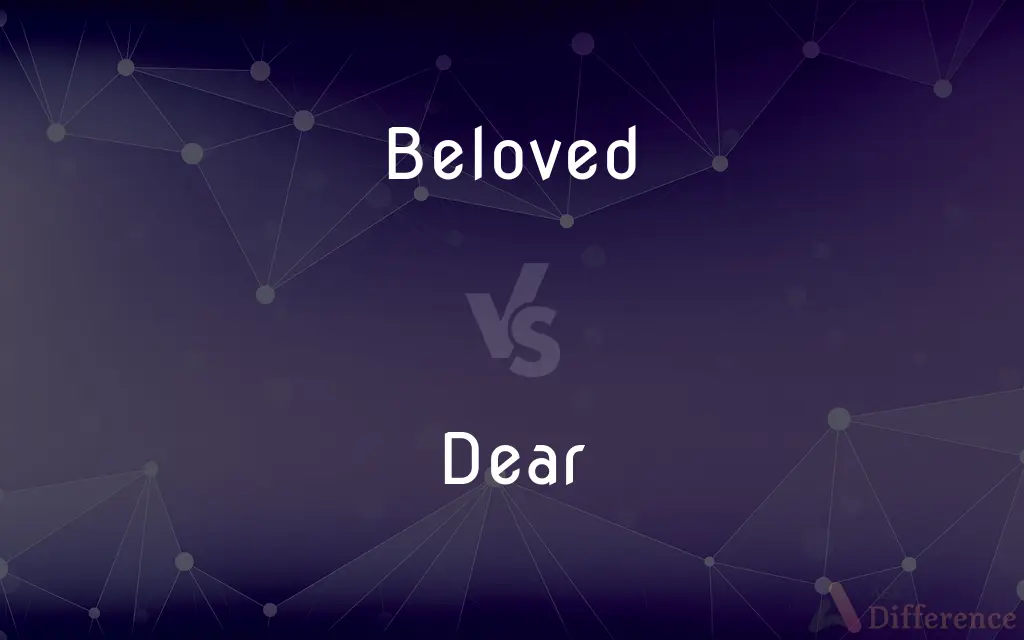Beloved vs. Dear — What's the Difference?
By Tayyaba Rehman & Urooj Arif — Updated on March 8, 2024
Beloved emphasizes deep affection or love, often enduring, whereas dear can denote affection but is also commonly used to express high esteem or value.

Difference Between Beloved and Dear
Table of Contents
ADVERTISEMENT
Key Differences
Beloved is a term that conveys a deep and enduring affection, often used in a romantic or very close personal relationship. Dear, on the other hand, is a versatile term that can express affection, high regard, or importance. It is commonly used in both personal and formal communications to convey warmth or esteem. While dear can denote affection similar to beloved, its usage is broader, covering a spectrum from casual endearment to a polite form of address.
Beloved implies a profound level of love and care that goes beyond the ordinary. For example, one might refer to their spouse or a dearly held family member as their beloved, indicating a deep-seated emotional connection that is both intimate and long-lasting. In letters, starting with "Dear [Name]," illustrates its function as a respectful salutation, not necessarily indicating deep personal affection.
Beloved carries a more exclusive and intimate connotation than dear. It is reserved for individuals who hold an irreplaceable position in one’s heart, often associated with romantic love or deep family bonds. The term is less frequently used in casual or general contexts, highlighting its significance when it is employed. In contrast, dear is used in a wider range of contexts, including casual, familial, and formal settings. It can signify affection but is also a common courtesy in correspondence and greetings. This flexibility makes dear a more universally applicable term, though it may not always carry the same depth of emotion as beloved.
The choice between beloved and dear depends on the relationship's depth and the emotion's intensity one wishes to convey. Beloved signifies a profound, often romantic affection that is enduring and deeply felt. It's a term of endearment that denotes a significant emotional investment and a close, personal connection.
Comparison Chart
Connotation
Deep, enduring affection
Affection or high esteem
ADVERTISEMENT
Usage Context
Romantic or close personal relationships
Broad, including personal, formal, and casual communication
Emotional Depth
Implies a profound emotional connection
Can range from casual endearment to respectful address
Frequency of Use
Less common, reserved for special relationships
Widely used, versatile in application
Relationship Implication
Indicates an irreplaceable position in one’s heart
Used for a variety of relationships, not always indicating deep affection
Compare with Definitions
Beloved
Held very dearly.
His beloved guitar, a gift from his father.
Dear
A polite form of address.
Dear Mr. Smith, your appointment is confirmed.
Beloved
Enduring affection.
A song dedicated to his beloved.
Dear
Regarded with affection.
My dear friend from college.
Beloved
With great fondness.
The city remained his beloved home.
Dear
Highly valued.
A dear possession she couldn’t part with.
Beloved
Deeply loved.
Her beloved husband of 50 years.
Dear
At a high cost.
Bought the antique at a dear price.
Beloved
Cherished above others.
A beloved family heirloom.
Dear
Warmly or affectionately.
Dear Mother, I miss you.
Beloved
Dearly loved
His beloved son
Dear
Regarded with deep affection
He is very dear to me
A dear friend
Beloved
A much loved person
He watched his beloved from afar
Dear
Expensive
Five pounds—that's a bit dear!
Beloved
Dearly loved.
Dear
Used as an affectionate or friendly form of address
Don't you worry, dear
Beloved
Much loved, dearly loved.
Dear
At a high cost
They buy property cheaply and sell dear
Beloved
Someone who is loved; something that is loved.
Dear
Used in expressions of surprise, dismay, or sympathy
Oh dear, I've upset you
Beloved
(obsolete) belove.
Dear
Loved and cherished
My dearest friend.
Beloved
Greatly loved; dear to the heart.
Antony, so well beloved of Cæsar.
This is my beloved Son.
Dear
Greatly valued; precious
Lost everything dear to them.
Beloved
One greatly loved.
My beloved is mine, and I am his.
Dear
Highly esteemed or regarded. Used in direct address, especially in salutations
Dear Lee Dawson.
Beloved
A beloved person; used as terms of endearment
Dear
High-priced; expensive.
Beloved
Dearly loved
Dear
Charging high prices.
Dear
Earnest; ardent
"This good man was a dear lover and constant practicer of angling" (Izaak Walton).
Dear
(Obsolete) Noble; worthy.
Dear
Heartfelt
It is my dearest wish.
Dear
Severe; grievous; sore
Our dearest need.
Dear
A person who is greatly loved. Often used as a form of address.
Dear
An endearing, lovable, or kind person
What a dear she is!.
Dear
With fondness; affectionately.
Dear
At a high cost
Sold their wares dear.
Dear
Used as a polite exclamation, chiefly of surprise or distress
Oh dear.
Dear me.
Dear
(UK) High in price; expensive.
The dearer the jewel, the greater the love expressed.
Dear
Loved; lovable.
Dear
Lovely; kind.
Dear
Loving, affectionate, heartfelt
Such dear embrace tenderly comforts even in this dear sorrow.
Dear
Precious to or greatly valued by someone.
The dearer the giver, the dearer the trinket he brings!
Dear
A formal way to start (possibly after my) addressing somebody at the beginning of a letter, memo etc.
Dear Sir/Madam/Miss, please notice our offices will be closed during the following bank holidays:nb....
Dear
A formal way to start (often after my) addressing somebody one likes or regards kindly.
My dear friend, I feel better as soon as you come sit beside my sickbed!
Dear
An ironic way to start (often after my) addressing an inferior.
My dear boy, if your grades don't pick up I won't bounce you on, but over my knee!
Dear
(obsolete) Noble.
Dear
Severe, or severely affected; sore.
Dear
(obsolete) Fierce.
The Christens found the heathens dear, as the lion doth the bear.
Dear
A very kind, loving person.
My little cousin is such a dear, always drawing me pictures.
Dear
A beloved person.
Dear
An affectionate, familiar term of address, such as used between husband and wife.
Pass me the salt, would you dear?
Dear
An elderly person, especially a woman.
Dear
(obsolete) To endear.
Dear
Dearly; at a high price.
Dear
(dated) Indicating surprise, pity, or disapproval.
Dear, dear! Whatever were they thinking?
Dear
Bearing a high price; high-priced; costly; expensive.
The cheapest of us is ten groats too dear.
Dear
Marked by scarcity or dearth, and exorbitance of price; as, a dear year.
Dear
Hence, close to the heart; heartfelt; present in mind; engaging the attention.
[I'll] leave you to attend him: some dear causeWill in concealment wrap me up awhile.
His dearest wish was to escape from the bustle and glitter of Whitehall.
Dear
Of disagreeable things and antipathies.
In our dear peril.
Would I had met my dearest foe in heavenOr ever I had seen that day.
Dear
A dear one; lover; sweetheart.
That kiss I carried from thee, dear.
Dear
Dearly; at a high price.
If thou attempt it, it will cost thee dear.
Dear
To endear.
Dear
A beloved person; used as terms of endearment
Dear
A sweet innocent mild-mannered person (especially a child)
Dear
Dearly loved
Dear
With or in a close or intimate relationship;
A good friend
My sisters and brothers are near and dear
Dear
Earnest;
One's dearest wish
Devout wishes for their success
Heartfelt condolences
Dear
Having a high price;
Costly jewelry
High-priced merchandise
Much too dear for my pocketbook
A pricey restaurant
Dear
With affection;
She loved him dearly
He treats her affectionately
Dear
At a great cost;
He paid dearly for the food
This cost him dear
Common Curiosities
Can dear express the same depth of affection as beloved?
While dear can express affection, it generally does not convey the same depth of emotional connection as beloved.
Can beloved be used in formal contexts?
Beloved is typically reserved for personal and intimate contexts rather than formal ones.
Is dear appropriate for professional correspondence?
Yes, dear is commonly used in professional correspondence, especially as a salutation in letters and emails.
Can dear be used as a term of endearment?
Yes, dear is often used as a term of endearment in both personal and familial contexts.
Is beloved only applicable to romantic relationships?
Beloved is primarily associated with romantic relationships but can also apply to very close familial or friendship bonds.
How do beloved and dear reflect the nature of a relationship?
Beloved reflects a deep, intimate connection, while dear can signify a range of relationships from casual to formal, based on the context.
How do beloved and dear differ in their emotional implication?
Beloved implies a deeper, more enduring emotional bond, while dear can indicate a range of feelings from general fondness to respect.
Is there a scenario where beloved and dear are interchangeable?
While they can sometimes be used interchangeably in expressing affection, beloved typically denotes a closer, more intimate relationship.
Is it outdated to start a letter with "Dear [Name]"?
No, starting a letter with "Dear [Name]" is still a widely accepted and respectful practice.
How do the terms influence the tone of communication?
Beloved personalizes and deepens the emotional tone, whereas dear can either personalize or formalize the communication, depending on the context.
How does the choice between beloved and dear affect the recipient's perception?
The choice can significantly impact the recipient's perception, with beloved suggesting a deeper connection and dear being more versatile and widely applicable.
Can I use beloved to describe an object?
Yes, beloved can describe a highly cherished object, though it's more commonly used for people.
Are there any cultural differences in the use of beloved vs. dear?
Cultural contexts might influence the frequency and settings in which beloved and dear are used, but their fundamental connotations remain consistent across cultures.
Can the use of beloved be seen as overly sentimental?
In some contexts, using beloved might be viewed as overly sentimental or intimate, depending on the relationship between the individuals involved.
Is it common to use dear in everyday conversation?
Yes, dear is commonly used in everyday conversation as a term of endearment or polite address.
Share Your Discovery

Previous Comparison
Handball vs. Basketball
Next Comparison
Craftsmanship vs. WorkmanshipAuthor Spotlight
Written by
Tayyaba RehmanTayyaba Rehman is a distinguished writer, currently serving as a primary contributor to askdifference.com. As a researcher in semantics and etymology, Tayyaba's passion for the complexity of languages and their distinctions has found a perfect home on the platform. Tayyaba delves into the intricacies of language, distinguishing between commonly confused words and phrases, thereby providing clarity for readers worldwide.
Co-written by
Urooj ArifUrooj is a skilled content writer at Ask Difference, known for her exceptional ability to simplify complex topics into engaging and informative content. With a passion for research and a flair for clear, concise writing, she consistently delivers articles that resonate with our diverse audience.
















































